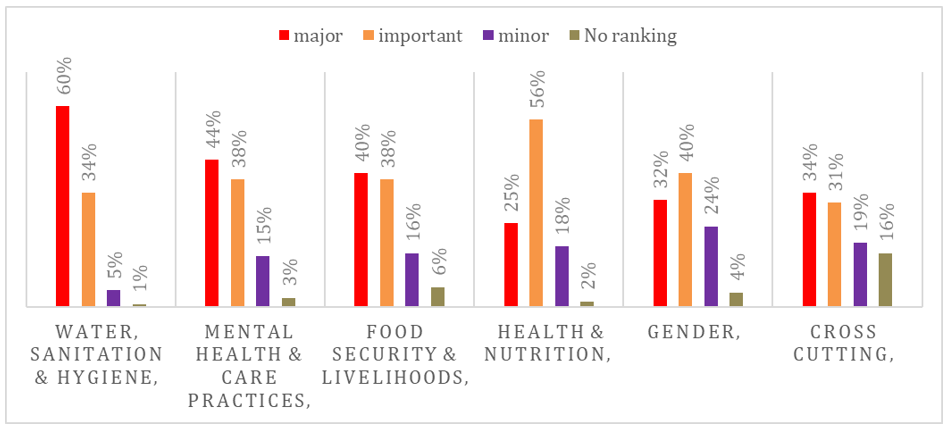Examining recommendations from Link Nutrition Causal Analysis (NCA)
This is a summary of a Field Exchange views article that was included in issue 67. The original article was authored by Carine Magen Fabregat
Carine Magen Fabregat is referent for Link NCA and qualitative methodology at ACF-France
Link NCA (Nutrition Causal Analysis) has been used worldwide to investigate causal pathways of undernutrition and provide recommendations to inform programmatic responses.
- Existing Link NCA studies appear to prioritise recommendations made by those conducting the analysis (the analysts) rather than community members.
- Systematically incorporating recommendations from community members into Link NCA studies would ensure that communities contribute to the planning and delivery of the nutrition response.
- The qualitative methodology involved in Link NCAs offers opportunities to listen to under-represented perspectives, e.g., of women, and to reposition non-governmental organisations with affected populations to address context-specific barriers in the field.
Background
Link NCA (Nutrition Causal Analysis) is a structured, participatory methodology developed by Action Contre la Faim (ACF) to analyse the causal pathways of undernutrition, particularly wasting. It combines quantitative and qualitative data analysis with feedback from local experts and/or community members to inform context-specific programming to improve nutrition outcomes.
Since its development, Link NCA has been used in over 40 studies worldwide. This article examines the findings and recommendations presented in Link NCA studies to (1) clarify the recommended strategies to address risk factors for undernutrition; and (2) compare the recommendations made by analysts to those made by communities.
Methods
The final reports of 43 Link NCA studies were used to create and analyse data from three databases, including:
- A study database, n=43: describing the study context and findings
- A risk database, n=725: including the risk factors for malnutrition identified and prioritised by Link NCA methodology in each study
- A recommendation database, n=1646: including recommendations made by Link NCA analysts and communities, if available
Results
Study characteristics
The largest proportion of Link NCA studies was conducted in Ethiopia (n=5) and Bangladesh (n=5), followed by Kenya (n=4) and Chad (n=3). Between two and six studies were published annually since 2011, except for in 2017 when 10 were published. Most reports were published in English or French. The majority of the studies (80%) were carried out by ACF, either independently or in a partnership. Most of the studies (80%) were conducted in settings with a high stunting prevalence and five were conducted in refugee camps. Most studies (88%) presented risk factors for malnutrition and all but three studies presented operational recommendations.
Risk factors
Figure 1 shows the ranking of importance of the identified risk factors by sector. Risk factors related to food security and livelihoods were identified more often than those from other sectors. Risks related to water, sanitation and hygiene (WASH) were more frequently ranked as ‘major’ risks. Risks within the health and nutrition sector were ranked as ‘important’ more often than those from other sectors.
Figure 1: Prioritisation of risk factors by sector

Overall recommendations
A total of 1,646 recommendations were made by the Link NCA studies. Of these, 49% came from studies that collected community recommendations and 21% were recommendations from community members directly. Approximately 29% of recommendations were related to food security, 22% to health and nutrition, 21% to WASH, 12% to mental health and care practices and 10% to gender. As with the risk factors, most recommendations related to the food security sector followed by both the health and nutrition and WASH sectors.
Community vs. analyst recommendations
Of all the Link NCA studies, 40% (n=17) collected recommendations from community members through a community workshop/meeting. Community recommendations were more routinely collected by analysts in stable contexts than during acute crises and in rural settings rather than refugee camps. Studies that collected community recommendations were more likely to have a non-governmental organisation (NGO) response plan in place. Recommendations made by communities differed from those made by the analysts:
- Community recommendations related more to food security and livelihoods and gender while the analysts’ recommendations featured health and nutrition, mental health and care practices more often.
- Community recommendations focused on improving access to services and to building or rehabilitating and distributing inputs whereas the analysts’ recommendations focused on raising awareness.
Importance of community recommendations
The differences in the recommendations made by the analysts and communities highlights the importance of a community’s involvement in decision making. However, more than half of the Link NCA studies did not incorporate community recommendations and/or did not highlight these in their final reports. Such recommendations should be systematically incorporated into Link NCA reports, ensuring that community knowledge and perspectives are valued and contribute to the joint planning and delivery of the response. Women’s voices are particularly rare in scientific publications or in Link NCA expert workshops. The qualitative component of the Link NCA methodology therefore provides an opportunity to listen to under-represented perspectives and to investigate areas currently neglected in nutrition programmes.
In addition, qualitative methods provide an opportunity for NGOs to reposition themselves with the affected populations, to intensify dialogues and to gain a deeper understanding of the determinants of, and responses to, malnutrition. This is particularly urgent in the context of increasingly limited resources and the need to improve the coverage and sustainability of programmes.
Conclusion and next steps
This analysis highlights the need for humanitarian actors to work with greater awareness of the perspectives of individuals and communities. The joint planning and delivery of humanitarian programmes with the communities concerned should move from intention to action. This will also help NGOs to respond to obstacles in the field, including the challenges of greater needs, fewer resources and poor coverage and sustainability of, and adherence to, interventions. In future, Link NCA studies can contribute to these efforts by documenting the implementation and follow-up of community recommendations.
For more information, please contact Carine Magen Fabregat at cmagenfabregat@actioncontrelafaim.org


